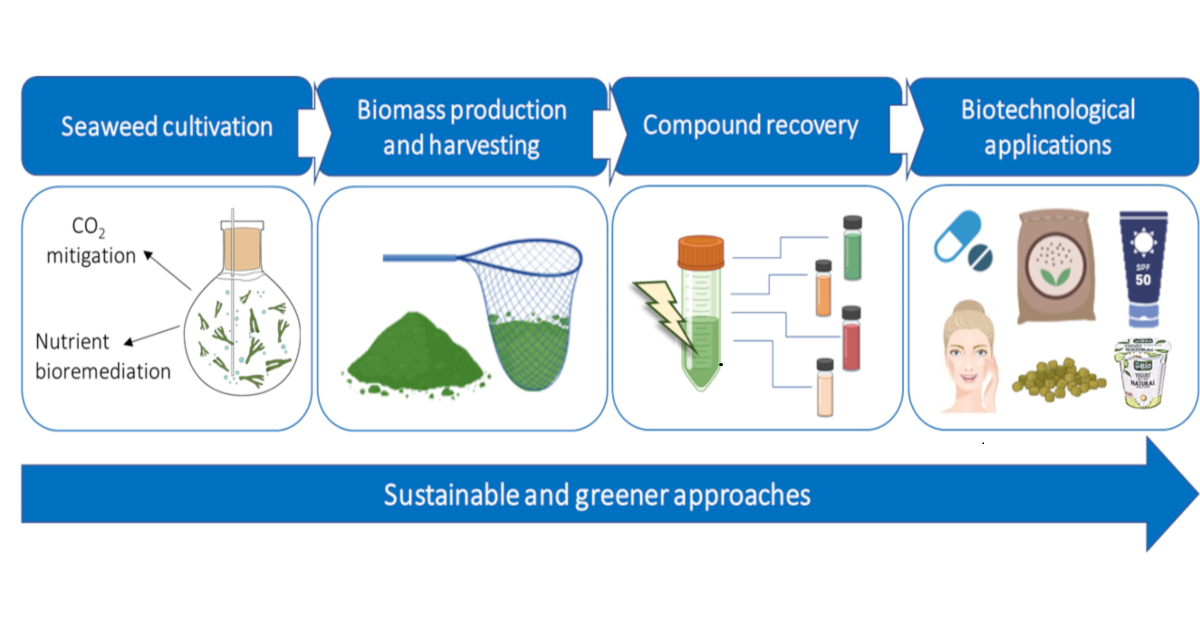- 3.1Impact Factor
- 4.8CiteScore
- 23 daysTime to First Decision
A Sustainable Approach to Macroalgae and Microalgae: From Cultivation to Compound Recovery and Biotechnological Applications
This special issue belongs to the section “Environmental Biotechnology“.
Special Issue Information
Dear Colleagues,
This Special Issue intends to address the recent advances related to macroalgae and microalgae, from their cultivation and harvest to compound extraction and functional ingredient recovery, as well as their application in greener and more sustainable contexts. The importance of macroalgae and microalgae production has been increasing globally, not only due to their significant ecological role but also because their biomass and compounds have a wide range of biotechnological applications including in the food, pharmaceutical, nutraceutical, feed, cosmetics, and agricultural industries. From a cultivation perspective, macroalgae/microalgae farming offers other potential benefits including nutrient bioremediation (the removal of nutrients from aquaculture effluents for biomass growth) and a climate benefit as CO2 mitigators, in addition to the above-mentioned role as a source of ingredients for food and nutraceutical products, as well as as biofertilizer and biostimulant for agriculture. Therefore, insights into new techniques for seaweed and microalgae production and processing are relevant to this Issue, particularly on how the whole process can be made more sustainable. In addition, the subsequent steps regarding harvesting, specifically the extraction of compounds of interest and functional ingredients, i.e., pigments, polysaccharides, antioxidants, phenolic compounds, and proteins, are usually considered one of the most expensive in algal-based industrial bioprocesses, mainly owing to the excessive processing costs and environmental impacts. Therefore, the application of biorefinery strategies and new emerging extraction technologies can help by being part of an integrated solution and contribute to a novel bioprocess that is expected to be less expensive, greener, and more sustainable in the coming years.
We welcome fundamental research on the above topics, as well as original work identifying the major opportunities, prospects, and challenges in the pursuit of a more sustainable seaweed and microalgae industry—from cultivation to compound extraction and their biotechological applications.
Dr. Joana Assuncao
Dr. Isabel Costa Azevedo
Guest Editors
Manuscript Submission Information
Manuscripts should be submitted online at www.mdpi.com by registering and logging in to this website. Once you are registered, click here to go to the submission form. Manuscripts can be submitted until the deadline. All submissions that pass pre-check are peer-reviewed. Accepted papers will be published continuously in the journal (as soon as accepted) and will be listed together on the special issue website. Research articles, review articles as well as short communications are invited. For planned papers, a title and short abstract (about 250 words) can be sent to the Editorial Office for assessment.
Submitted manuscripts should not have been published previously, nor be under consideration for publication elsewhere (except conference proceedings papers). All manuscripts are thoroughly refereed through a single-blind peer-review process. A guide for authors and other relevant information for submission of manuscripts is available on the Instructions for Authors page. BioTech is an international peer-reviewed open access quarterly journal published by MDPI.
Please visit the Instructions for Authors page before submitting a manuscript. The Article Processing Charge (APC) for publication in this open access journal is 1600 CHF (Swiss Francs). Submitted papers should be well formatted and use good English. Authors may use MDPI's English editing service prior to publication or during author revisions.
Keywords
- macroalgae
- microalgae
- cultivation
- biomass
- compound extraction
- functional ingredients
- biorefinery
- bioremediation
- industry application

Benefits of Publishing in a Special Issue
- Ease of navigation: Grouping papers by topic helps scholars navigate broad scope journals more efficiently.
- Greater discoverability: Special Issues support the reach and impact of scientific research. Articles in Special Issues are more discoverable and cited more frequently.
- Expansion of research network: Special Issues facilitate connections among authors, fostering scientific collaborations.
- External promotion: Articles in Special Issues are often promoted through the journal's social media, increasing their visibility.
- e-Book format: Special Issues with more than 10 articles can be published as dedicated e-books, ensuring wide and rapid dissemination.

